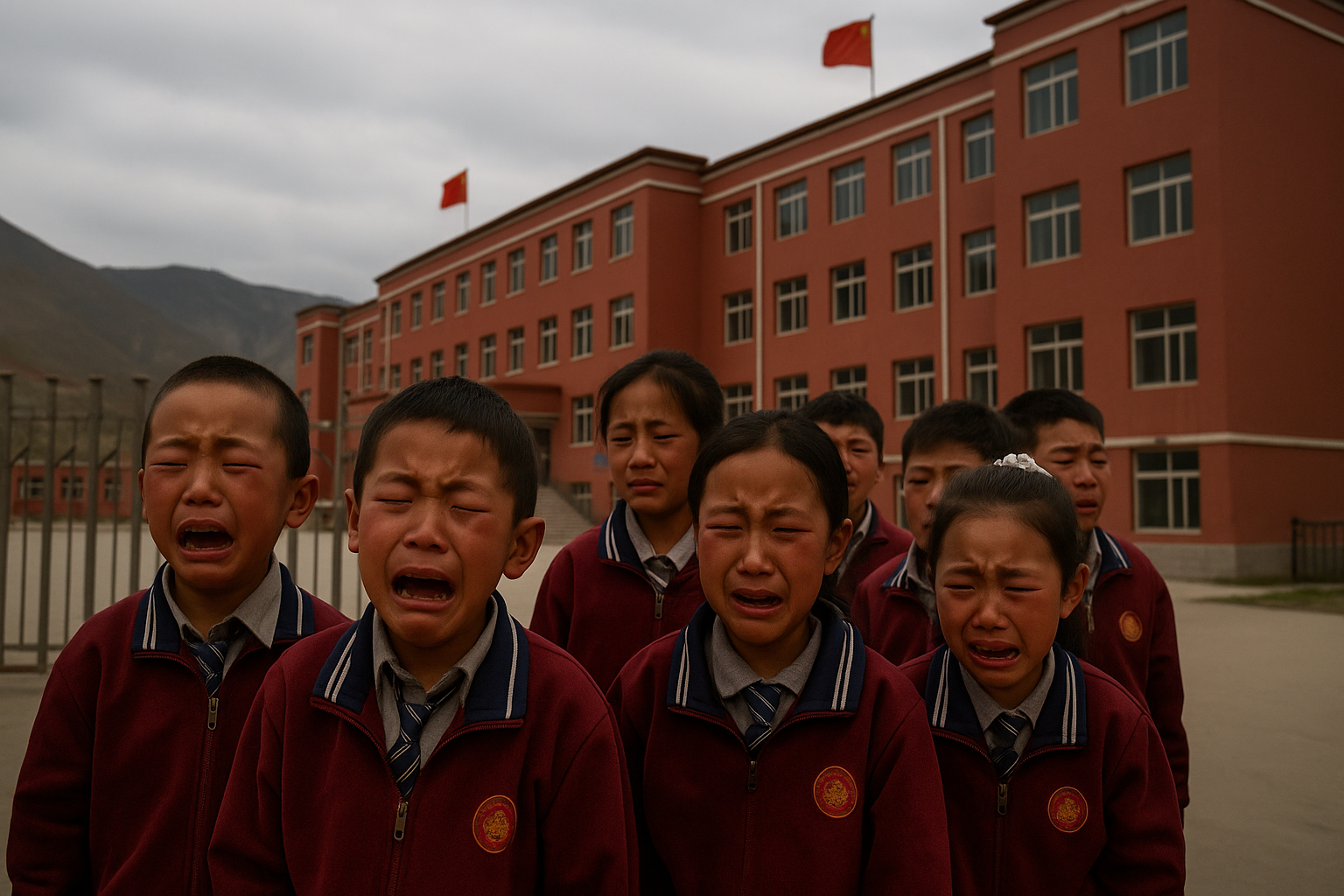Beijing calls it “bilingual education” and “national unity.” UN experts call it something else: a mass, mandatory programme that separates Tibetan children from their families and dilutes their language, faith, and identity. The scale is staggering. UN Special Rapporteurs estimate that nearly one million Tibetan children—about three in four between the ages of six and eighteen—now live in government-run boarding schools, often far from home.
A System of Forced Separation
The residential school network stretches across the Tibetan plateau, consolidating smaller village schools into large, centrally run institutions. For many families, distance makes regular visits impossible and parental influence minimal. UN experts warned in 2023 that the system was “aimed at assimilating Tibetans into majority Han culture,” and eroding children’s ability to communicate in Tibetan with parents and grandparents.
While Beijing insists enrolment is voluntary and beneficial, the programme has hardened under Xi Jinping. During a visit to a Tibetan boarding school in Qinghai in June 2024, Xi declared that education must “implant a shared consciousness of Chinese nationhood … from an early age.” That was not a slip of the tongue; it was a statement of intent.
Language as a Weapon
Language sits at the heart of this campaign. Tibetan children are required to complete almost their entire schooling in Mandarin Chinese. Tibetan is pushed to the margins—sometimes taught as a single subject, often dropped altogether.
The trend has accelerated since 2023, when schools in prefectures like Ngaba switched to Chinese-language textbooks in core subjects. From 2025, all grades in these areas will be taught exclusively in Mandarin. The implications are clear: Tibetan will no longer serve as a language of science, mathematics, or history, but only as a vestige of culture.
A further blow has been delivered at the university level. China has announced that Tibetan will no longer count as a core subject in the national college entrance exam, the gaokao, beginning with the 2026 cohort. For Tibetan students, this effectively closes off higher education pathways through their native language, forcing them to compete exclusively in Mandarin. The policy all but guarantees a steep decline in the professional and academic use of Tibetan within a generation.
International Pushback
Scrutiny is growing. In 2023, three UN Special Rapporteurs described China’s boarding schools as “a large-scale programme intended to assimilate Tibetans into majority Han culture, contrary to international human rights standards.”
In December that year, the European Parliament passed a resolution condemning “forced assimilation practices through Chinese boarding schools in Tibet,” urging their dismantling and the reopening of private Tibetan schools. The United States has imposed visa restrictions on Chinese officials linked to these programmes, with the U.S. Commission on International Religious Freedom going further in 2025, accusing Beijing of carrying out “cultural genocide against Tibetan Buddhists.”
Beijing rejects these charges, claiming the schools are voluntary, free, and improve opportunities for Tibetan children by teaching Mandarin, the language of wider economic life. State media highlight dormitories and modern classrooms as proof of progress. Yet the government has refused to provide independent data on enrolment practices, language of instruction, or visitation rights—leaving international experts reliant on testimonies, leaked directives, and policy documents.
Why This Matters for Canada
For Canadians, the issue resonates uncomfortably close to home. The structure of forced residential schooling, designed to weaken Indigenous identity, mirrors aspects of Canada’s own past. That legacy has equipped Canadians with a unique perspective on why such programmes are not just educational policies, but tools of cultural destruction.
Canada also has a significant Tibetan diaspora, many of whom fled precisely these policies. In 2023, Parliament’s Subcommittee on International Human Rights heard testimony from the Tibet Action Institute describing Beijing’s boarding schools as “colonial in design and effect.” Ottawa has already sanctioned Chinese officials over abuses in Xinjiang; extending similar Magnitsky-style sanctions to those overseeing Tibet’s boarding schools would be consistent with Canada’s legal framework and moral stance.
Canada could also align with the EU and the U.S. in pressing for reciprocal access—demanding that Canadian diplomats, journalists, and UN monitors be allowed to observe conditions in Tibetan areas. At a time when reciprocity is increasingly central to Western engagement with China, Tibet should not be left outside the conversation.
The Stakes
Cultures don’t vanish only through war; they can be hollowed out by design. When children grow up speaking primarily the language of the state, learning a curriculum built on the majority’s culture, and practising a stripped-down version of their own faith—far from family and community—the result is not pluralism but conformity.
What is unfolding in Tibet is not simply repression; it is the attempted dismantling of a civilisation. A people who preserved their identity through centuries of conquest and exile may lose it not through bullets, but through blackboards.
The tears of Tibetan children at school gates are not mere homesickness. They are a warning—an urgent call for conscience and action. Whether Canada and its allies answer that call may determine whether Tibet’s unique culture survives into the next generation.

